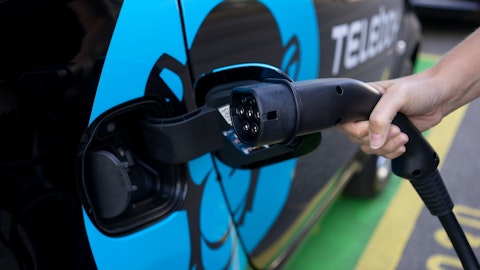Bill Larkin: Yes. I can’t comment right now on next year, but I can talk about through the end of the year, I have mentioned this, we do – we have multiple initiatives in place to try to convert our working capital into cash. And so continue to bring down our inventory levels, we are seeing some easing in the supply chain and take a looking at our purchasing and trying to bring down the inventory levels and convert that to cash, same thing with receivables. We are trying to shorten the cash conversion on that and drive down our receivables and drive down our DSOs. We look at that very closely. Also, as I mentioned, we do – are looking at some debt financing opportunities over in Europe, and we had a couple of term sheets actually multiple terms sheets in the hand that we are working through that process that will provide additional debt funding to support the operations.
Bill Peterson: Okay. Thanks for that. And I guess just coming back to the JV. So, I was wondering if you can provide more information, I guess this what remains to be ironed out here in the next few months. And I presume these are straightforward based on their commentary and confidence that it’s going to be signed early next year. But I guess how should we think about a plan B if for whatever reason this doesn’t work out? And along those lines, like what would then be the best means to commercialize and scale HPDI? I mean are there other OEMs that can – that may be interested in stepping in maybe even similar to what, I guess is rail OEM did in terms of funding the efforts?
Tony Guglielmin: It’s Tony here. I am not going to take the bait on what happens if it doesn’t close, but per se, but I just – I will say that – and I will say it’s with confidence. I don’t think there is any concern that we are not going to get to closing the signing of definitive agreements which is really – we will call it a signing and closing is really a two step. The definitive agreements are very close on. And there is not a lot – there is a couple of issues we need to work through, but I would expect we are very close on those. The reason why for the delay in closing is not – nothing to do with any additional negotiation to be done. It’s just going to be literally working through the carve-out of the business out of Westport, including our large engineering team that will be moving over, setting up the legal entities, getting the assets transferred in.
So, the delay – I will say, the delay the timeframe between today and closing in Q2 next year is, frankly, just the time it’s going to take to execute on it. No, I said I wouldn’t take the bait. We have all the confidence that we are going to close with Volvo. But theoretically, sure, there is lots of other OEMs who are. We are interested to see what we have done and I am sure that wouldn’t be a concern we would continue to execute and grow this business with or without. But I just want to say unequivocally, we have confidence we are going to get there.
Bill Peterson: Okay. Thanks for sharing the insights.
Operator: Thank you., There appear to be no further questions. I will return the conference back to the speakers for closing comments.
Tony Guglielmin: Well, great. Thank you, operator, and it’s Tony here again. I just want to thank you all for joining us today. As you gathered, we are very excited about not just the future business, but we are seeing improvements in our current business. And we are executing. We intend to execute against our key strategies, and we look forward to providing you further updates over the course of the next few months. And beyond that, we look forward to speaking to you again at our year-end in the New Year. So, thank you very much for joining us.
Operator: Thank you. This does conclude today’s conference call. Thank you all for attending. You may now disconnect your lines.
Follow Westport Fuel Systems Inc. (NASDAQ:WPRT)
Follow Westport Fuel Systems Inc. (NASDAQ:WPRT)
Receive real-time insider trading and news alerts



